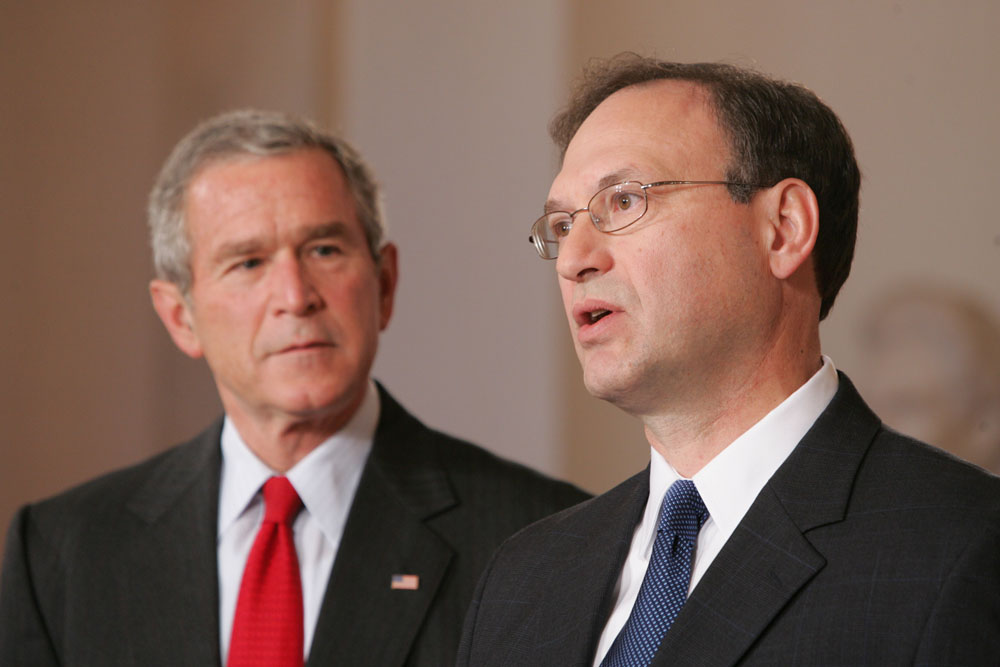The most faithful originalist

Sam Alito reminds us that he remains outraged that one time Neil Gorsuch got one right:
Justice Samuel Alito is evidentially toting around an old grudge.
At a Thursday night event at the Antonin Scalia Law School at George Mason University, he had harsh words for the two conservative justices who joined the majority in Bostock v. Clayton County.
The 2020 opinion said that the Civil Rights Act of 1964, which prohibits sex-based discrimination, extends to gay and transgender workers. Justice Neil Gorsuch wrote the majority opinion, in which he was joined by the liberals and Chief Justice John Roberts.
Speaking via a video feed Thursday, Alito called Gorsuch a “colleague and friend,” but said that grounding the decision in the text of the 1964 law was “in my view indefensible,” according to the Washington Post.
“It is inconceivable that either Congress or voters in 1964 understood discrimination because of sex to mean discrimination because of sexual orientation, much less gender identity,” Alito said. “If Title VII had been understood at that time to mean what Bostock held it to mean, the prohibition on discrimination because of sex would never have been enacted. In fact, it might not have gotten a single vote in Congress.”
Note that based on Alito’s theory that the contemporaneous, subjective policy expectations of lawmakers trump the text they enacted, Obergefell is wrong, Brown is wrong, Loving is wrong, Bradwell v. IL was correct, etc. etc. etc.
The crudity of Alito’s “originalism” and the lack of interest in grand theory or anything but the most shallow and cherry-picked law office history in his opinions mean that sometimes legal scholars deny that he’s an originalist at all. But this is a good thread arguing that in conflating “originalism” with reactionary traditionalism Alito is in a sense the most faithful originalist of all:
Justice Alito stands out on the current Court for how closely the outcomes of his decisions track the political views of conservative Republicans.
In terms of methodology, he’s pretty standard—which means pluralist/eclectic. 1— Joseph Fishkin (@joeyfishkin) May 13, 2022
@lsolum and others have pointed out that Alito’s draft Dobbs opinion is completely non-originalist: it’s completely uninterested in what academic originalists care about, the original public meaning of the words of constitutional text. None of that in this opinion at all.3— Joseph Fishkin (@joeyfishkin) May 13, 2022
Don’t take my word for it. Ask the Wall Street Journal, a leading conservative paper that will undoubtedly be in any future corpus linguistics database. Its triumphant headline about Dobbs?
Justice Alito’s Originalist Triumph
8https://t.co/PA5p14I5io— Joseph Fishkin (@joeyfishkin) May 13, 2022
If politicians, voters, supporters, critics, ordinary speakers, media outlets, and even some professors say that the word "originalism" in our political culture means conservative traditionalism, then…
…isn't that basically what the word means? 14— Joseph Fishkin (@joeyfishkin) May 13, 2022
Alito is part of a political project, and that project uses “originalism” as a code word to signal adherence to a reactionary traditionalism that is almost always consistent with Republican policy preferences. In this sense, he is the ultimate originalist.
William Rehnquist once admitted that “strict constructionism” just meant a judge “who favors criminal prosecutors over criminal defendants, and civil rights defendants over civil rights plaintiffs.” Originalism just performs the same function while covering even more policy territory.


